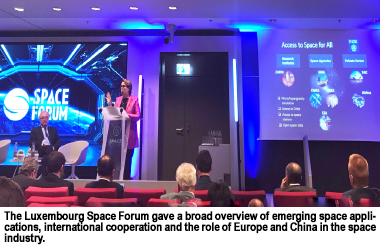Luxembourg Space Forum: Consolidating Global Space Cluster
by Omkar Nikam
 Luxembourg, May 23, 2019-The dynamics of the global space community are honing the focus towards developing more international cooperation, with these opening opportunities to transform various industrial sectors. Countries like Luxembourg are becoming the focal points of the global space entrepreneurs by encouraging huge amounts of investments in the space sector, punching far above their weight in this emerging industry.
Luxembourg, May 23, 2019-The dynamics of the global space community are honing the focus towards developing more international cooperation, with these opening opportunities to transform various industrial sectors. Countries like Luxembourg are becoming the focal points of the global space entrepreneurs by encouraging huge amounts of investments in the space sector, punching far above their weight in this emerging industry.
This was highlighted by the Luxembourg Space Forum, held on 21st and 22nd May 2019, which gave a broad overview of emerging space applications, international cooperation and the role of Europe and China in the space industry. Carine Claeys, Head of the Space Task Force, Ji Wu, Chinese Academy of Sciences, and Marc Serres, CEO of Luxembourg Space Agency (LSA) were some of the highlighted speakers at the forum. With the engagement of space industry experts in various sessions, attendees received key insights into the current and future trends of the space industry.
Public-Private Partnerships in Military Satellite Communications: A European Perspective
Partnership and commercial approach are now triggering the utilization of defense satcom in Europe. GovSat is a leading public-private joint venture between SES and Luxembourg government that provides satcom resources for the European Defense Forces. Currently, GovSat’s major customers are NATO (North Atlantic Treaty Organization) forces in Afghanistan and the Belgian Navy off the coast of Africa. The launch of GOVSAT-1 satellite in 2018 is an indication that Europe has strong goals to be independent in the Defense satellite communications (satcom) resources. Various delegates from SES, GovSat, and ESA provided some insights into the challenges faced by the satellite industry in the defense domain, among them the development of strong end-to-end encryption for defense customers.
Terrestrial connectivity possesses a greater challenge to provide secure communications. The terrestrial communication is reliable when deployed in one specific location; whereas is a more effective source of communication for multiple locations especially in military operations. But satellite connectivity is flexible and reliable for using Quantum Key Distribution (QKD) for military communications. In April 2019, European Commission and European Space Agency initiated the development of pan-European quantum communication infrastructure.
ESA’s role in this agreement is to develop satellite quantum communication systems called SAGA (Security And cryptoGrAphic mission). And the development of quantum communication is one of the critical aspects of the European Commission’s Digital Europe Programme. This gives a crystal-clear picture of the increasing public-private partnerships in Europe. Meanwhile, on 20 May 2019, NATO’s Communication and Information Agency planned to release a budget of EUR 318 million in business opportunities for satellite communications and cybersecurity.
Looking at past one decade of military satcom, where the government itself was the producer, manufacturer, and consumer, there was limited scope for innovation. But now, Europe is taking military satcom to a whole new level by showcasing a trend of encouraging public-private partnerships in some of the critical areas of space applications for Defense. Indicators of the success or failure of this strategy could be, among other things, the extent to which programs such as GovSat are seen as being appealing to non-European governments.
China: Breaking the Myth
‘Massive – Rapid – Progressive’ is what defines the advancement of Chinese Space Industry.
China has ensured its growth in space applications on a national level through top-down programs, largely executed by state-owned enterprises (SOEs). And now it is expanding internationally with a massive investment in space infrastructure. The fireside chat session with delegates from the Chinese Academy of Sciences and Shanghai Jiao Tong University provided an in-depth view of how and what is fueling China’s growth in the space sector. The Chinese government’s keen interest in the development of space applications for civil, commercial, and defense purposes is the key to the country’s rapid progress in the space sector. In China, commercial space companies are under the umbrella of social financing. The social financing can be described as the circulation of domestic money within the national borders. It includes direct and indirect financing via banking system, stocks and bonds on the capital market. The social financial strategy is the main tool in China for ensuring the growth of private space companies. This also brings in a new set of space applications which are more inclined towards creating social impact in the society.
China’s presence in Africa and its support for launching satellites for many of the African nations is a critical strategy to expand its Belt and Road Initiative (BRI). On the other hand, from a global perspective, China is helping the underdeveloped and developing nations with its space resources for the development of their national economy. In January 2019, China announced its plans to fund USD 72 million for EgyptSat-2, an earth observation satellite program by Egypt. And in May 2019, China also agreed to finance US$ 6 million for Ethiopia’s first earth observation satellite ETRSS-1; of which the estimated cost is US$ 8 million. Both Ethiopia and Egypt are advancing in space sector with the Chinese grants worth millions. All these global financing efforts by China are building a foundation for the growth of countries that are lagging behind in their space program development. Though there are some dubious speculations about Chinese investment in foreign countries, China is currently one of the nations that are trying to reconcile the global space cluster.
Emerging Space Applications: Innovation or Indistinguishable?
According to Seraphim Capital, in 2018, venture capitalists invested US$ 3.25 billion in the various space companies. The NewSpace industry is surely changing the ways of utilizing space data and implementing it for terrestrial purposes. But few questions remain unanswered, is the New Space bringing innovation? Or is it just reworking on the foundation laid by the traditional space companies?
Using earth observation data by implementing AI, machine learning, and data analytics are helping the government and private institutions to reduce the efforts in urban planning, climate change monitoring. But from a satcom standpoint, Internet of Things (IoT) is the only application that seems to yield fruitful results in the future for energy, agriculture, and food sector. While other New Space applications of satcom like providing internet from space are making the market too crowded with little or no space for innovation. The entry of Amazon in the satellite segment might fade out the companies that are providing ground segment services in the coming years.
The company recently partnered with Lockheed Martin to provide ground station services for startups from almost every major part of the globe. Similarly, OneWeb, SpaceX and Blue Origin are in the race to provide global internet connectivity via Low Earth Orbit (LEO) satellites. With respect to this competitive ecosystem, these companies slightly ignoring the need of strong ground segment capabilities. As the LEO satellites need fast uplink and downlink transmissions, this ground segment ignorance might be an issue for many of the LEO satellite operators.
The New Space industry players must critically think in which specific industrial segment they can provide the most amount of space applications. It will not only help the New Space market to grow but also to evolve efficiently and sustain for a longer period.
Conclusion
The Luxembourg Space Forum brought together global space industry experts to discuss and engage with the space community. During the forum, Marc Serres, CEO of LSA announced the launch of LSA’s Data Center. The aim of this Data Center is to support businesses in Luxembourg by utilizing data from European Copernicus Earth Observation programme. Luxembourg’s growing status as a space hub of Europe is a unique takeaway for many emerging space nations.
On the other hand, China remains one of the key players in the global space sector. Due to the country’s increasing presence in Pakistan, Ethiopia, Angola, Egypt, etc. China is set to achieve milestone in the space industry by displaying one of the largest international cooperation in the world. While the geopolitical wave is hitting the space industry from every corner, it is also leading to the loss of space assets for many nations. For example, due to the Brexit, UK is taking some of the losses on its shoulders such as the removal of Galileo Satellite Security Monitoring Centre (GSMC) from its territory; which is now relocated to Spain. Therefore, it is the need of the hour that every nation should carefully balance their national and international interests to ensure growth and sustainability of space resources.
-----------------------------------------------------
 Omkar Nikam is a correspondent of the Satellite Executive Briefing magazine based in Strasbourg, France. He also works as a Market Analyst with Orbital Gateway Consulting (OGC) Before joining OGC, he completed his Master in Space Studies from the International Space University and had over three years of experience in the Indian media and marketing industry. He can be reached at: omkar.nikam@community.isunet.edu
Omkar Nikam is a correspondent of the Satellite Executive Briefing magazine based in Strasbourg, France. He also works as a Market Analyst with Orbital Gateway Consulting (OGC) Before joining OGC, he completed his Master in Space Studies from the International Space University and had over three years of experience in the Indian media and marketing industry. He can be reached at: omkar.nikam@community.isunet.edu






